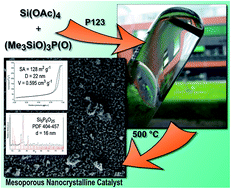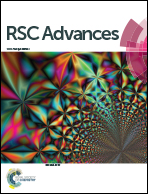Non-aqueous template-assisted synthesis of mesoporous nanocrystalline silicon orthophosphate†
Abstract
The first synthesis of mesoporous nanocrystalline silicon orthophosphate Si5P6O25 is presented. The synthetic procedure is based on the non-hydrolytic sol–gel reaction in the presence of Pluronic P123 template and subsequent calcination in air. The condensation of silicon acetate, Si(OAc)4, and tris(trimethylsilyl)phosphate, OP(OSiMe3)3 (TTP), in non-aqueous solvents driven by elimination of trimethylsilyl acetate provides a homogeneous network with a high content of Si–O–P bonds and SiO6 moieties. After burning out the template, mesoporous silicon orthophosphate was obtained with surface areas up to 128 m2 g−1 and pore sizes around 20 nm. The nanocrystalline Si5P6O25 phase forms relatively easily (500 °C, 4 h) in comparison with other synthetic routes. All samples were characterized by SEM, TEM, elemental analysis, TGA, nitrogen adsorption, SAXS, 1H, 13C, 29Si, and 31P solid-state NMR spectroscopy, and powder XRD. These xerogels showed superior catalytic activity and selectivity in methylstyrene dimerization.



 Please wait while we load your content...
Please wait while we load your content...